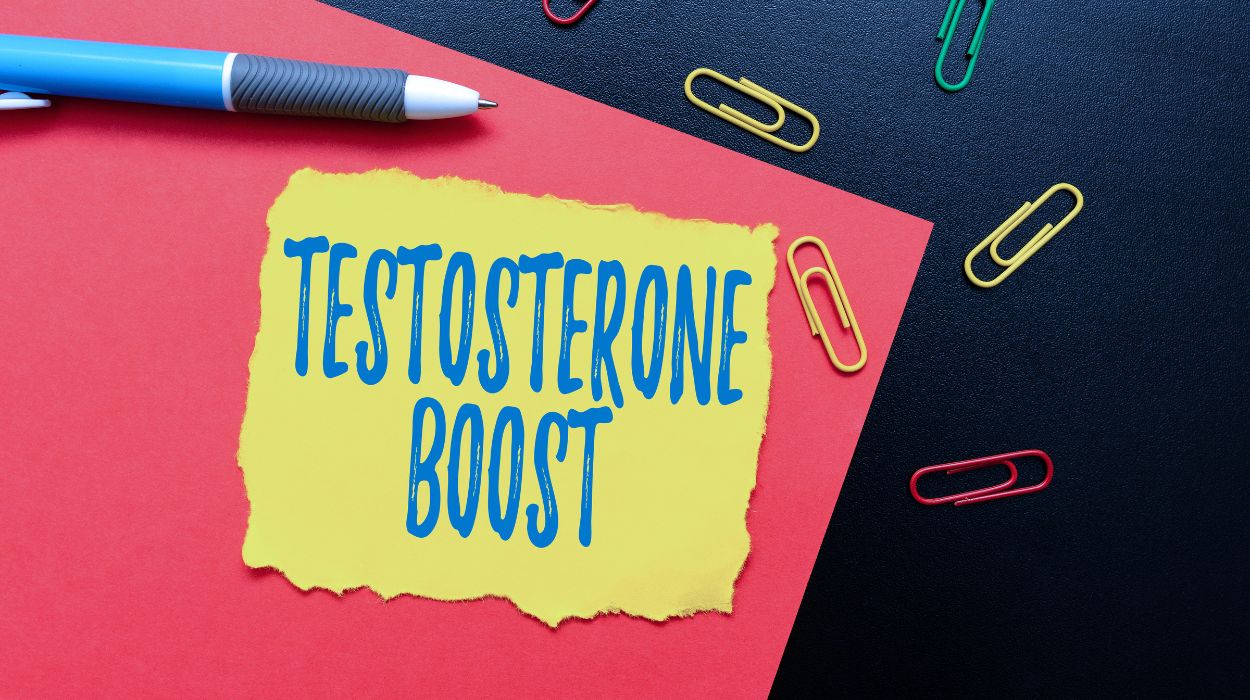Low testosterone tends to be a problem amongst certain groups like older adults. For this reason, we have done the due diligence to discuss
How Can You Increase Your Testosterone Level Naturally?
- Lose Weight
- Exercise
- Get Adequate Sleep
- Maintain A Balanced Diet
- Stress Reduction
- Avoid Anabolics
- Getting More Vitamin D and Zinc
- Avoid Recreational Drugs and Alcohol Abuse
- Avoid Estrogen-Like Chemicals
How To Increase Testosterone Naturally
Lose Weight
Being overweight or obese can affect testosterone levels greatly! If you present with a high BMI, chances are that testosterone levels are converted into the female hormone called estrogen. This occurs through a negative signal in the hypothalamus of the brain that tells the body that we may have too much testosterone.
It is a very well known fact that losing weight can reverse these effects and boost testosterone levels. In order to lose weight an individual must drive caloric deficit by eating less food and/or boosting healthy lifestyle activities.
Let’s say that an individual needs 3000 calories per day to maintain a certain body weight. Come the new year and this individual decides that it is time to lose some weight. This example individual begins to eat 2800 calories per day and takes up 30 minutes of cycling on a daily basis. This modification in activity could burn an additional 300 calories. Subsequently, driving a 500 calorie deficit, which in as little as a week can promote weight loss.
Exercise

Exercise itself is another way to increase testosterone levels naturally. Exercises specifically strength training and high-intensity interval training have been shown to raise testosterone levels through serum concentrations[1]. This may help boost testosterone to enter the normal range.
Some examples of proven exercises to produce testosterone acutely may include:
- Barbell Squat
- Barbell Deadlift
- Barbell Bench Press
- Barbell Back Rows
- Lat Pulldown
- Car Pushes
- Hill Sprints
Get Adequate Sleep
REM sleep is directly correlated to testosterone. Research by Repoult and Cauter found that reducing sleep from 8 hours to 5 hours (3 hours less sleep) may decrease testosterone by 10.4%. Sleep requirements are entirely dependent on the individual which is not always controllable, so it is difficult to determine if someone is getting ‘enough sleep’. Personally, I can function properly with 5-6 hours of sleep per night.
Ways to improve sleep could be to tackle sleep hygiene through:
- Avoiding the use of devices before bed (i.e, mobile phone and laptop)
- Using the night setting on devices if you do use them
- Sleep and wake up at similar times to build sleep drive
- Get some exposure to the sun rays during daylight hours
- Limit alcohol as it can cause sleep apnea
- Limit caffeine and do not consume it 6 hrs before bed
Maintain A Balanced Diet
Firstly, I want to highlight that soy products do not affect testosterone levels. A healthy diet can aid in the pursuit of supporting healthy testosterone levels. One should
- Consume a reasonable amount of calories and macronutrients to maintain a healthy body weight
- Consume an adequate macronutrient intake (protein, healthy fats and carbohydrates)
- Consume an adequate micronutrient intake to avoid deficiency, so make sure you are getting your fruits and vegetables in
- Avoid a low fat diet as fat helps regulate testosterone
Stress Reduction
Chronic stress reduction can also boost your testosterone levels. Stress may interact with the hypothalamus of the brain[2] and lower testosterone.
Some psychological stress-reducing strategies include:
- Deep breathing
- Massage and spa break
- Yoga
- Talking to friends and family
- Music and watching TV
- Aroma therapy
- Exercise
- Adequate Sleep
- Healthy Lifestyle Changes
Avoid Anabolics
For many fitness enthusiasts and athletes, it can be tempting to begin a cycle of anabolic steroids or hormones.
These substances may raise testosterone levels and interact with the androgen receptors in the body to modify muscle mass, strength, and performance. Although, comes the risk of shutting off the natural production of testosterone, especially if they are not administered and cycled properly. On a side note, anabolics may also cause health decrements like skin conditions, heart disease, cancers, brain damage, liver and kidney damage.
When the testosterone is available in the bloodstream in abundance, the body signals to the brain that there is too much testosterone, where production is then halted.
My suggestion would be to avoid taking any of these substances, unless they have been prescribed by your healthcare provider. If you present a low testosterone levels your doctor may recommend testosterone replacement therapy, which can normalize testosterone levels.
This therapy will be covered in more detail later in the article.
Getting More Vitamin D and Zinc
Low levels in Zinc and vitamin D have been linked to low testosterone, so it is important to consume plenty of foods high in zinc like meats, shellfish and some nuts. Not to mention some sun exposure for vitamin D. In the worst case, you can obtain vitamin D supplementation, which can be crucial in countries and seasons with less sunshine.
Avoid Recreational Drugs and Alcohol Abuse

Alcohol and drug abuse can impair the functions of the Leydig cells of the testicles, where testosterone is produced.
Common recreational drugs[3] include:
- Cocaine
- Heroin
- LSD
- GHB
- Cannabis
- Benzos
- Hallucinogens
- Inhalants
- Ketamine
- Khat
Many services can help you quit. For example, in the UK we have ‘Mind UK’, which provides educational content and 1 to 1 support.
Avoid Estrogen-Like Chemicals
As we mentioned, estrogen is the female hormone. In high amounts it can offset hormonal balance.
For this reason, it is important to avoid estrogen-like chemicals. There are a variety of chemicals that are found in certain household products i.e., certain hygiene products, food packaging and cookware. The chemicals to watch out for include:
- Atrazine
- Parabens
- Bisphenol-a
- Phthalates
- Palates
- Perfluorinated chemicals
- Nonylphenol
- Triclosan
What Is Testosterone?
Before we get into the main body of the article, I should highlight that through aging and underlying health conditions, we may experience a natural decline in the male sex hormone testosterone.
Although testosterone is present amongst both genders, it is 20 times higher in male, the reason being why we call it the male sex hormone.
Testosterone production takes place at the Leydig cells of the testicles, hence its name ‘testosterone’. To clear any confusion, it is also produced in the ovaries of the female as they obviously do not have testicles.
Testosterone binds to the androgen receptors of the body, which plays a vital role in overall health and well-being, as I stressed below.
Normal Testosterone Levels
The physiological range of blood testosterone is between 264 to 916 ng/dL[4], this is recognised as ‘healthy testosterone levels’. As we age, testosterone begins to drop in a slow decline.
If testosterone levels drop below 300 ng/dL, this creates a significant risk factor for Low T symptoms that I have mentioned in the next section.
In most cases, it is near enough impossible to get your testosterone much higher than 1000 ng/dL. The only way to do so is via artificial testosterone injections, which are illegal without prescription in most countries.
The only use case for artificial testosterone would be bodybuilding, to gain an unnatural amount of muscle and strength.
I DO NOT recommend taking any kind of artificial testosterone, unless prescribed by your medical doctor.
Symptoms Of Low Testosterone
Evidence suggests, if testosterone levels drop below the physiological range of around 300 mmol/DL, this is recognised as a testosterone deficiency and can wreak havoc by causing:
- Drop in Mood
- Drop in Sexual desire
- Drop in Sexual function
- Drop in Sperm health
- Drop in Penile blood flow
- Erectile dysfunction
- Drop in energy
In the medium term you would expect an incremental degradation (Continuous loss in functional tissues) in:
- Muscle mass
- Bone mass
Not to mention, an increase in:
- Body fat percentage
- Visceral and subcutaneous body fat
Why is this a problem? Well these changes can have major long-term health risks and ailments like:
- Falls and blunt force injuries
- Fractures
- Drop in metabolic rate
- Muscle strains and tears
- Weight gain and obesity
- Diabetes
- Heart Disease
- Certain Cancers
Testosterone Replacement Therapy To Boost Testosterone Levels
Testosterone treatment is prescribed if T levels drop below 300 ng/dL (low testosterone) and your body is no longer producing it naturally.
This can occur as a result of aging or past substance abuse, i.e recreational drugs or anabolic steroids.
The dose of injectable free testosterone will entirely depend on the individual, but the idea is to drive an individual out of the lower testosterone range.
Conclusion
All in all, we have learned that testosterone is the male sex hormone. Low testosterone levels are thought to be below 300 ng/dL, whereas the high end of the physiological range is around 1000 ng/dL.
Low testosterone levels come with a whole host of short, medium and long term effects that can really diminish the quality of your life.
Fear not, because we have provided 9 ways that may prevent or reverse low testosterone levels and reduce the risk of the many adverse effects.
In the worst case, if these strategies fail to reverse testosterone levels, you may be eligible for testosterone replacement therapy, where your medical doctor will administer an injection of free testosterone.
Frequently Asked Questions
u003e300 mmol/DL would be at the low end of the ‘normal’ physiological range, whereas u003c1000 mmol/DL would be at the high end.
Anyone who presents low testosterone (u003c300 ng/dL) may be eligible.
You may experience low energy, mood and sexual desire. Other noticeable symptoms include a loss in muscle mass and weight gain.
A low testosterone level may hinders overall hormone levels, libido, sexual function, adrenal glands, immune system, heart health, and the list goes on.
There is no ‘best tip’, but if you intend to maintain a healthy testosterone level, you should eat enough calories, macro and micronutrients. In terms of certain foods, you can try whole grains, fish oil, olive oil, beef, chicken, shellfish etc.
Firstly, I would like to mention that most people refer to resistance training as weight lifting, they are actually two different things. So yes! Resistance training has been linked with testosterone increases. I would never overdo both, because this can cause overtraining in the longer term which can then lower testosterone levels.
Absolutely! Age is not the only factor. Certain medical conditions, drug and alcohol abuse or use of anabolics can all cause low testosterone.
I would say it is best to combine all of the methods if you can. If I had to choose one, it would be avoiding alcohol and drug abuse may keep you in the higher levels u003e300 ng/dL.
 Expert's opinion
Expert's opinion
